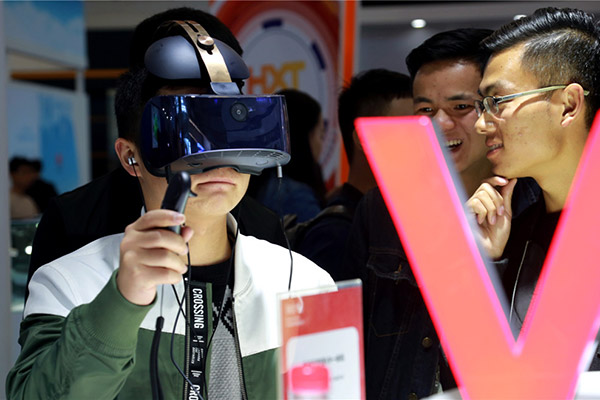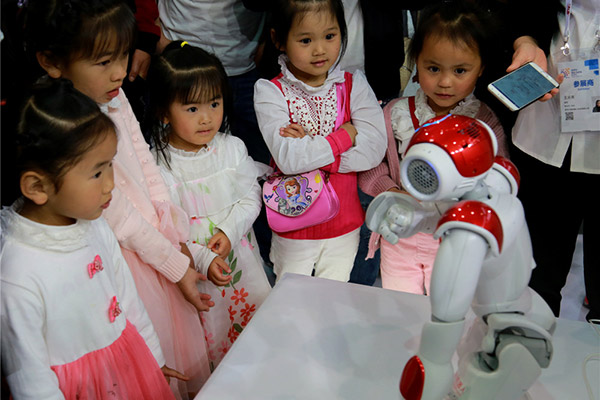Big data begins to make a big impact
2017-12-09
China Daily
 A visitor experiences virtual reality technology at the China International Big Data Expo in Guiyang, Guizhou province, in May. The expo was the first in the world to specifically use a big data theme.[Photo by Yang Jun/China Daily]
A visitor experiences virtual reality technology at the China International Big Data Expo in Guiyang, Guizhou province, in May. The expo was the first in the world to specifically use a big data theme.[Photo by Yang Jun/China Daily]
Last year, after he completed a bachelor’s degree in computer science in the Inner Mongolia autonomous region in the north of China, 22-year-old Song Jian made a decision that sent him in a different direction to his classmates. He headed south and landed a job in Chengdu, capital of Sichuan province.
“The city is famous for beauties, and I thought I would definitely find someone to love there,” he said, with a laugh.
Song did fall in love, but not with a person. Instead, his affections were engaged by big data —a concept that is spreading nationwide but hasn’t yet been put into widespread practical use —through his work in the Chengdu branch of Youedata, a tech company headquartered in Beijing.
Early this year, Song moved again, this time to the company’s offices in Guiyang, capital of Guizhou province. Although he has left the bright lights behind by relocating to a third-tier city, he believes the transfer will provide a promising future.
The Guizhou government has taken the initiative to promote poverty relief through the use of big data. In the past three years, the mountainous province has been transformed into an innovation hub by the arrival of leading companies, including Apple, Alibaba and Hyundai Motors.
In the first half of the year, the money generated by data utilization in the province was 5.26 billion yuan ($794 million), a jump of 64 percent compared with the same period last year. It was first time the local sector had registered double-digit growth, according to statistics provided by the provincial government.
Guian New Area, an hour’s drive from Guiyang, is a 1,795-square-kilometer industrial technology park that is home to more than 400 companies in the big data industry.
“The park concentrates the world’s top enterprises in one place, which will provide more convenience for cooperation and the development of business opportunities. It also provides more possibilities for the future,” Song said.
Driving force
With the support of the National Information Center, Youedata is responsible for the operation of six State-owned big data centers across the country, including one in Guiyang, and more than 100 big data companies have started operations in them.
Since its establishment in December last year, Guiyang Youedata has become a driving force in the city’s big data sector, cooperating with local public sector companies to explore and use data resources. At present, the company is mainly focused on data-cleaning work.
“It’s a process of desensitization; cleaning sensitive, security —and privacy-related items from the original data to produce information that can be further used for behavioral analysis or risk prediction,” said Huang Xiaoyin, director of the company’s integrated management office.
For example, phone companies have the names, ID numbers and phone numbers of all their customers, along with logs of their calls and text messages. Some of the information, such as consumption preferences or the frequency of phone use can be analyzed via big data to develop business strategies. However, the information must first be “desensitized” —which means all the names, ID numbers and addresses must be erased to protect customers’ privacy.
According to Huang, 80 percent of the company’s employees are experts in big data research and development, and they are young, mainly ages 22 to 40.
“Big data is bringing opportunities and vitality to this mountainous city, which is attracting more young talent from the province and neighboring cities seeking to further their careers,” she said.
Dong Chuanye, deputy director of Guiyang Youedata, said the provincial and municipal governments have played leading roles in big data development, compared with authorities in many other cities.
In addition to special funding support, tax breaks and other policies, and free use of office space for five years, the government helps to promote business opportunities between the park’s big data companies and potential customers through expos and conferences. In August, Guiyang will host the China International Big Data Industry Expo, which will be attended by several leading global businesses, including Microsoft, Intel, Dell, Oracle SAP and Tesla, he said.
The local government also provides strong support for the exchange and use of data, authorizing big data companies to access information collected by the government and other public sector bodies in the city. To date, 15,033 data dictionaries and 243 data sets from 51 sectors have been made available to authorized companies.
“This is crucial to the development of the big data industry. Data is the industry’s blood. Without it, we couldn’t survive, not to mention develop. In many other cities, data barriers still exist between different public sector bodies, but Guiyang has been a pioneer in breaking down those walls,” Dong said.
 Children watch a robot in action at the expo.
Children watch a robot in action at the expo.
Better integration
To many Chinese, big data is still “high-tech jargon” that barely relates to their daily lives. However, residents of Guiyang have already been given a glimpse of the future, and big data is set to become better integrated with public services.
Illustrations of the uses of big data are displayed at the Guiyang Big Data Application Demonstration Center. For example, when some trucks were reported buried by a landslide in Guiyang after heavy rain, analysts used traffic flow records and photos taken by cameras along the highway to determine that three vehicles were in trouble, which proved to be the case when the recovery services arrived on the scene.
“Through news reports and free lectures provided by the government in the past two years, nearly all the public sector workers in Guiyang know, more or less, the importance of big data and how it will contribute to social development,” said Liu Jun, 38, a local civil servant.
He noted that big data can also be used to satisfy public demand, such as information related to parking.
“If all public parking lots were registered, data analysis could indicate their number and locations on a smartphone app. That’s just one way of using big data. I believe the future possibilities are limitless,” he said.
Xu Ke, director of Guizhou Youedata’s management department, said the biggest challenge is a lack of talent. “The education resources in Guizhou are limited. To speed up the development of the big data industry, we need more professionals. However, the quality of human resources in the province still lags behind that in metropolises such as Beijing and Shanghai,” he said.
Internships
Xu said the company has launched pilot training programs with professionals to provide training for its employees. It also provides internships for students at Guizhou Education University and sends experienced technicians to deliver lectures at the college.
Zuo Yu, dean of the College of Mathematics and Computer Science at the university, said the school launched a major in Big Data Technology and Utilization in 2014, and the first batch of students will graduate in July.
Five junior students are working as interns at Guiyang Youedata, while seven others are with another company in the park.
“Internships in those businesses before graduation can better train the students to meet the market demand,” Zuo said, adding that the companies will employ nearly all the students placed with them when they graduate.
The major was a secondary choice for most students the first year it was offered, but this year, it was the first choice of every student on the course.
“People understand that the big data industry has a promising future. Next year, we will double the number of students on the course and encourage more talent from other cities and foreign countries to work or study here,” he said.




